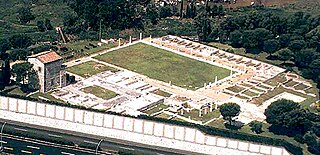Related Research Articles

Lucius Volusius Saturninus was a Roman senator from the powerful plebeian Volusia gens, or family. He held several offices in the emperor's service. Saturninus attracted the attention of his contemporaries for his long life: he died at the age of 93, and having sired a son at the age of 62.
Quintus Volusius Saturninus was a Roman Senator who lived in the Roman Empire during the Principate. He was consul in the year 56 with Publius Cornelius Scipio as his colleague.
Lucius Volusius Saturninus, also known as Lucius Volusius was a Roman Senator from the powerful plebeian Volusia gens, or family. He was a cousin of emperor Tiberius.
Quintus Volusius also known as Quintus Volusius Saturninus was a senator of the Roman Republic who lived in the 1st century BC.
Lucius Volusius Saturninus was a Roman Senator who lived in the 1st century. He served as an ordinary consul in 87, as the colleague of the emperor Domitian. He is known entirely from inscriptions.
Volusia Cornelia, also known as Cornelia Volusia was a Roman woman of Patrician status who lived in the late 1st century. She was the daughter of the senator Quintus Volusius Saturninus, suffect consul in 92. She was born and raised in Rome. Her cognomen Cornelia, she inherited from paternal great-grandmother Cornelia Lentula, the daughter of the consul of 3 BC, Lucius Cornelius Lentulus from the gens Cornelia.
Licinia Cornelia Volusia Torquata also known as Cornelia Volusia Torquata Licinia was a noble Roman woman who lived in the Roman Empire in the second half of the 1st century and first half of the 2nd century.
Volusia Saturnina also known from her funeral inscription as Volusia Latina Saturnina was a Roman noble woman who lived in the Roman Empire in the second half of the 1st century BC and first half of the first century AD.
Marcus Lollius Paullinus Decimus Valerius Asiaticus Saturninus was a prominent Roman Senator who was a powerful figure in the second half of the 1st century and first half of the 2nd century. He is also known by the shorter form of his name, Decimus Valerius Asiaticus.

Lucius Funisulanus Vettonianus was a Roman general and senator during the reigns of the Flavian emperors. He was suffect consul in the nundinium of September to October 78 with Quintus Corellius Rufus as his colleague.
Marcus Vettulenus Civica Barbarus was a Roman senator of the second century AD. A member of the Patrician class, he held the office of consul ordinarius in 157 with another patrician, Marcus Metilius Aquillius Regulus, as his colleague. Barbarus was also a member of the sodales Antoniniani, a religious fraternity which attended to the cult of the emperor Antoninus Pius.
Publius Manilius Vopiscus Vicinillianus was a Roman senator of the 2nd century AD, who was ordinary consul for the year 114 as the colleague of Quintus Ninnius Hasta.
Lucius Annius Fabianus was a Roman senator and general. He was suffect consul for the nundinium of November–December AD 141; his colleague is not known.
Servius Cornelius Dolabella Metilianus Pompeius Marcellus was a Roman senator and patrician. He was suffect consul for the first nundinium of the year 113 as the colleague of Gaius Clodius Crispinus; Marcellus replaced the consul prior Lucius Publilius Celsus, who stepped down as consul at the end of January.
Quintus Pompeius Sosius Priscus was a Roman senator active in the mid-second century AD, who held a number of offices in the emperor's service. Priscus served as ordinary consul for the year 149 as the colleague of Lucius Sergius Salvidienus Scipio Orfitus. His life is known entirely from inscriptions.
Lucius Nonius Calpurnius Torquatus Asprenas was a Roman senator of the early Roman Empire, who flourished under the reigns of Nero and Vespasian. He was suffect consul around the year 78.

The gens Sentia was a plebeian family at ancient Rome. Members of this gens are first mentioned in history toward the end of the Republic. The first of the Sentii to obtain the consulship was Gaius Sentius Saturninus, in 19 BC.
Lucius Aninius Sextius Florentinus was a Roman senator, who held a number of imperial appointments during the reigns of Trajan and Hadrian. He died while governing Roman Arabia; his unnamed son had a tomb prepared for him at Petra, which still stands.

The ancient Roman Villa dei Volusii or Villa dei Volusii-Saturnini is an archaeological site located in the municipality of Fiano Romano, next to the ancient Roman town and sanctuary of Lucus Feroniae, along the route of ancient Via Tiberina.
The Volusia gens was an ancient Roman family.
References
- ↑ Paul Gallivan, "The Fasti for A. D. 70–96", Classical Quarterly , 31 (1981), pp. 191, 218
- ↑ P.I.R. , vol. III, stemma for V 666
- ↑ Rudolf Hanslik, "Volusia Q.f. Cornelia 23", Realencyclopädie der classischen Altertumswissenschaft , Supplement 9A, col. 1863
- ↑ P.I.R., vol. III, V 665
- ↑ Anthony Birley, The Fasti of Roman Britain (Oxford: Clarendon Press, 1981), p. 13
- ↑ John Morris, "Leges Annales under the Principate", Listy filologické / Folia philologica, 87 (1964), p. 334
- ↑ Eck, "Die Familie der Volusii Saturnini in Neuen Inschriften aus Lucus Feroniae", Hermes, 100 (1972), p. 484
- ↑ Birley, Fasti of Roman Britain, pp. 14f
- ↑ Eck, "Die Familie der Volusii Saturnini", pp. 478-481